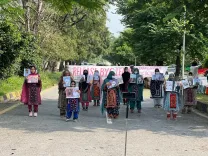South Sudan Initiates Its First Household Budget Survey Post-Independence

Synopsis
Key Takeaways
- First household budget survey since 2011.
- Aims to enhance institutional capacity.
- Focus on national production across 10 states.
- Key data for economic indicators like GDP.
- Funded by the African Development Bank.
Juba, April 8 (NationPress) South Sudan has officially initiated its first-ever household budget survey since achieving independence in 2011, aiming to bolster institutional capacity and economic governance in the youngest nation globally.
Augustino Ting Mayai, the director-general of the South Sudan National Bureau of Statistics, indicated that the Household Budget Survey (HBS) will target various economic sectors, particularly focusing on national production throughout 10 states and three administrative areas, as reported by Xinhua news agency.
"One major challenge South Sudan faces is the lack of reliable and current empirical data across diverse sectors, which impedes the development of effective policies," Mayai stated during the launch event in Juba, the capital.
The last nationally representative household budget survey in South Sudan was carried out in 2009, prior to its independence from Sudan.
Mohamed Abchir, the resident representative of the United Nations Development Program in South Sudan, emphasized that the absence of dependable statistical data continues to be a significant barrier to effective policymaking in the nation.
Abchir remarked that the HBS is a key initiative under the Institutional Support Project designed to enhance Economic Governance in South Sudan, funded by the African Development Bank (AfDB).
"The project emphasizes three primary areas: improving data and statistical systems, enhancing parliamentary oversight capacity, and institutionalizing public investment programs," he explained.
The information gathered from the survey will be vital for generating statistics such as the Consumer Price Index, Gross Domestic Product, and other socio-economic indicators.
Themba Bhebhe, country manager for the AfDB in South Sudan, stated that the 10-million-US-dollar survey is part of a broader initiative to aid ongoing public finance management reforms, enhance the national budget framework, and mitigate economic and political fragility.
"The support encompasses technical assistance aimed at enhancing the capability to generate and disseminate innovative knowledge that will inform policy, strategy, and development," Bhebhe added.









